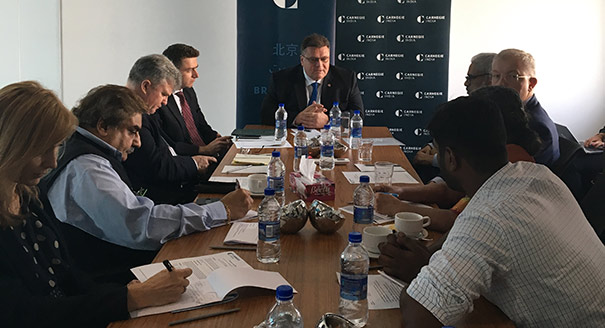Geopolitical uncertainties stemming from Russia’s assertiveness, Brexit, and China’s increased economic incursions continue to barrage Europe. Given their proximity to Russia and their position as members of both the European Union and the North Atlantic Treaty Organization, the Baltic states offer important perspectives on European geopolitics. Carnegie India hosted Lithuanian Minister of Foreign Affairs Linas Linkevičius for a private discussion on the changing dynamics and geopolitical landscape of Europe.
Discussion Highlights
- A Rules-based International Order: Participants began by discussing the changing international order, stating that nations are increasingly inclined toward safeguarding their own interests, often at the expense of shared commitments and international law. They emphasized, therefore, that international engagements should be transparent, assure accountability to all citizens, and be based on democratic principles, the rule of law, and multilateral cooperation. All participants agreed that multilateral institutions such as the United Nations Security Council require substantial reforms to make it more representative and a meaningful forum for dialogue. They added, however, that the accountability of existing permanent members should be enforced to protect nations from being coerced into altering policies and redefining borders by “bigger” powers. Participants added that uncertainty in U.S. commitment to Europe and Asia has pressured several states to shoulder additional leadership and responsibility within their regions to protect their common democratic values.
- Transatlantic Ties: Participants discussed the current trajectory of transatlantic relations. While some argued that the United States is distancing itself from its European allies, others asserted that it is counterproductive to sensationalize this notion. They argued that U.S. interests in the European continent should be preserved, and affirmed that the transatlantic relationship is a global security asset.
- New Transnational Security Threats: Participants observed that the asymmetric challenges faced by the world today—energy security, cyberattacks, terrorism, and propaganda—are unconventional in nature and tend to transcend territorial borders. Looking at energy security, they explained that Lithuania overcame its energy dependence on Russia through an innovative alternative: “Independence,” a floating liquefied natural gas storage and regasification unit anchored in the Klaipeda port of Lithuania. This enabled Lithuania to import gas from other states like Norway, Finland, Sweden, and the United Arab Emirates, which it can share with its neighbors in the region. Participants asserted that such strategic infrastructural projects must be encouraged to ensure that political tools are not weaponized to stifle the autonomy of states. Further, some participants called for vigilance in the face of foreign investments aimed at acquiring strategic assets and critical technologies. In this context, participants applauded the European Commission’s recent proposal of a new framework that mandates the screening of foreign investments into the European Union. This, they said, was a critical move toward ensuring foreign investments are not used as geoeconomic tools.
- Indo-Lithuanian Collaboration: Participants also discussed the untapped potential of the Indo-Lithuanian relationship, given common cultural values and linguistic roots. They called for increased interactions between the people of India and the Baltics and identified life sciences, information and communications technology, and sophisticated laser technology as potential areas for bilateral engagement between India and Lithuania. While historically India has perceived the Baltics through the prism of Russia, participants emphasized that India must support the efforts of the Baltic states to reach beyond their region and embrace their roles as EU and NATO member states with autonomous interests in the global order.
The event report was prepared by Arushi Kumar, research assistant at Carnegie India.
